Adelaide Thorne's Blog, page 2
June 27, 2017
The Integer
Book 2 had a title, and then it didn't. It had a title that I thought was pretty cool, but the more I researched the word, the more I realized that anamnesis is something far too deep and complex to be attributed to a single book. Anamnesis is a more encompassing word that, in my mind, is the crux of the whole trilogy. So Book 2 became title-less again.
I remember how long it took me to come up with a name for The Trace. I tried variations of different things for weeks until I finally settled on a title that I thought worked. The Integer came from a two-minute search. When I read the full definition, it clicked.
To explain why I chose The Integer, I probably need to explain why I chose The Trace. Essentially, The Trace is about Ella searching through remnants for a conclusion that is expounded upon in The Integer. There are left behind traces that she is tracing back to their origin. That's a pretty vague explanation, but I don't want to give too much away. An integer is a whole number and, more importantly, a complete entity. In the first book, Ella traces evidence to discover the whole picture - a complete entity - that is detailed in The Integer. So, a trace leads to an integer. Get it?
What is the state of The Integer now, you might ask? Let me tell you, dear reader. Book 2 is in the content-rewrite phase. This means my editor has given me his critiques, and now I'm reevaluating The Integer's execution. Once we're satisfied with that, so begins the line editing.
I love editing. I've talked about it before; I'll talk about it again. Editing is fun because the spilling process is over, and now I have the almost whole picture that I get to fix. I like fixing. And I definitely like whole pictures (like integers. Get it again?).
My personal writing/editing process goes as follows:Spill words in Microsoft WordPrint out giant document at StaplesScribble and scratch out all over the 300+ pagesFix up Word document a few more times until I get to the stage where I think the story is coming to a finishing closeTake a break from writingRead the document on my Kindle, which helps me find grammar mistakes/typosFix all those on WordGive the book to someone to readAssess their edits/suggestionsDo any Word changes that need to be doneKindle it up until I'm satisfiedRun to my editor and say, "K, here you go."
It might be a weird process, but it works for me. Taking a break and changing the medium in which I read the book are the two most important steps. A break gets me out of the tunnel vision that developed while writing, and reading on something other than a computer gives my eyes a break and helps me view the book as more of a book and less of a bunch of words put together. On a Kindle, my book seems real and legit. I get a little giddy. Then I go through the "cringing" phase where I regret ever writing. It's a process, folks.
During this content-edit stage, I must take my brain out of Book 3. Not that I haven't, erm, already started rewriting it. Not that I haven't, erm, already started a novella that will take place after Book 3.
Anyway. Now let's chat about the cover. Say goodbye to your favorite freckled gal, because The Integer will feature someone much less normal. I'm not talking about a Grifter here - just your average, hyper-thorough teenage guy who makes Ella (and me) want to pull her hair out because he's so flipping systematic and particular and stubborn.
Ethan Sheedy, welcome to the book cover.
Annelise worked her magic on this guy, who has just the "My life is too serious for you to understand" expression that he needed. He's even got that freckle by his eye, as described in Le Trace! Don't worry; his black-and-white state is only temporary. He's currently in the hands of Marianne , who loves putting up with my "Actually, make his eyes this color" and "What if you invert him?" and "I've decided I want Ella's face again; can you manipulate Ethan until he resembles Ella?" (Just kidding. Marianne would kill me. And say, "Uh, no" because she's a sensible human being.)
I'll keep you posted on the simultaneous progression of Ethan and The Integer. Stay tuned for the book synopsis and the reveal for the BACK cover! Any ideas?

I remember how long it took me to come up with a name for The Trace. I tried variations of different things for weeks until I finally settled on a title that I thought worked. The Integer came from a two-minute search. When I read the full definition, it clicked.
To explain why I chose The Integer, I probably need to explain why I chose The Trace. Essentially, The Trace is about Ella searching through remnants for a conclusion that is expounded upon in The Integer. There are left behind traces that she is tracing back to their origin. That's a pretty vague explanation, but I don't want to give too much away. An integer is a whole number and, more importantly, a complete entity. In the first book, Ella traces evidence to discover the whole picture - a complete entity - that is detailed in The Integer. So, a trace leads to an integer. Get it?
What is the state of The Integer now, you might ask? Let me tell you, dear reader. Book 2 is in the content-rewrite phase. This means my editor has given me his critiques, and now I'm reevaluating The Integer's execution. Once we're satisfied with that, so begins the line editing.
I love editing. I've talked about it before; I'll talk about it again. Editing is fun because the spilling process is over, and now I have the almost whole picture that I get to fix. I like fixing. And I definitely like whole pictures (like integers. Get it again?).
My personal writing/editing process goes as follows:Spill words in Microsoft WordPrint out giant document at StaplesScribble and scratch out all over the 300+ pagesFix up Word document a few more times until I get to the stage where I think the story is coming to a finishing closeTake a break from writingRead the document on my Kindle, which helps me find grammar mistakes/typosFix all those on WordGive the book to someone to readAssess their edits/suggestionsDo any Word changes that need to be doneKindle it up until I'm satisfiedRun to my editor and say, "K, here you go."
It might be a weird process, but it works for me. Taking a break and changing the medium in which I read the book are the two most important steps. A break gets me out of the tunnel vision that developed while writing, and reading on something other than a computer gives my eyes a break and helps me view the book as more of a book and less of a bunch of words put together. On a Kindle, my book seems real and legit. I get a little giddy. Then I go through the "cringing" phase where I regret ever writing. It's a process, folks.
During this content-edit stage, I must take my brain out of Book 3. Not that I haven't, erm, already started rewriting it. Not that I haven't, erm, already started a novella that will take place after Book 3.
Anyway. Now let's chat about the cover. Say goodbye to your favorite freckled gal, because The Integer will feature someone much less normal. I'm not talking about a Grifter here - just your average, hyper-thorough teenage guy who makes Ella (and me) want to pull her hair out because he's so flipping systematic and particular and stubborn.
Ethan Sheedy, welcome to the book cover.
Annelise worked her magic on this guy, who has just the "My life is too serious for you to understand" expression that he needed. He's even got that freckle by his eye, as described in Le Trace! Don't worry; his black-and-white state is only temporary. He's currently in the hands of Marianne , who loves putting up with my "Actually, make his eyes this color" and "What if you invert him?" and "I've decided I want Ella's face again; can you manipulate Ethan until he resembles Ella?" (Just kidding. Marianne would kill me. And say, "Uh, no" because she's a sensible human being.)
I'll keep you posted on the simultaneous progression of Ethan and The Integer. Stay tuned for the book synopsis and the reveal for the BACK cover! Any ideas?

Published on June 27, 2017 21:00
June 5, 2017
The Evolution Of The Symbol
Once upon a time, the symbol didn't exist. And then someone was like, "You should have a symbol that carries throughout the book" and I was like, "Okay" and then the symbol existed.
The symbol has progressed from a crooked blob to a more crooked blob that's even blobbier. Here are my attempts at drawing that probably make the people in class wonder if I'm a psychopath who has an obsessive need to draw a weird shape all over the margins of her notebook.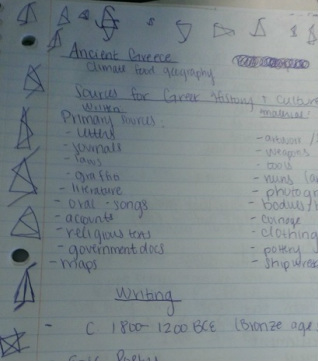
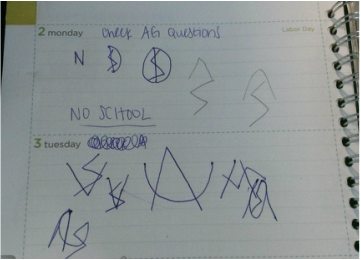
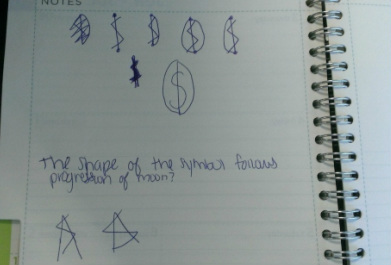



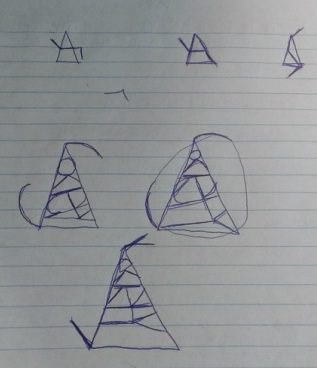
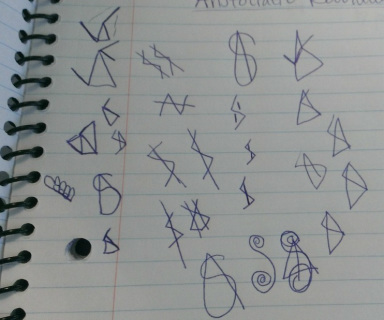




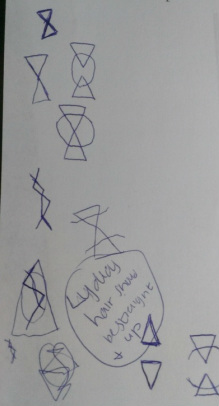

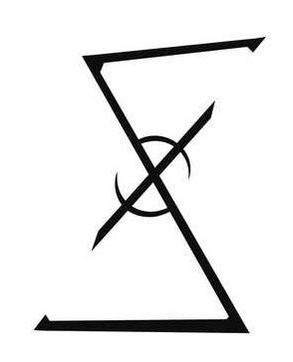 Should I be paying attention in class? Probably. But MISSION ACCOMPLISHED.
Should I be paying attention in class? Probably. But MISSION ACCOMPLISHED.
P.S. "Ancien Regime" is not a typo, but the political system in France pre-Revolution.
The symbol has progressed from a crooked blob to a more crooked blob that's even blobbier. Here are my attempts at drawing that probably make the people in class wonder if I'm a psychopath who has an obsessive need to draw a weird shape all over the margins of her notebook.














 Should I be paying attention in class? Probably. But MISSION ACCOMPLISHED.
Should I be paying attention in class? Probably. But MISSION ACCOMPLISHED. P.S. "Ancien Regime" is not a typo, but the political system in France pre-Revolution.
Published on June 05, 2017 21:00
May 29, 2017
Introducing Ella Kepler, Defender Of The Seven Galaxies
^^ Not really. Though that would be cool.
Ella Kepler was created in Astronomy class, hence the space reference here and throughout Whitewashed. Her name was stolen from my favorite childhood book, Ella Enchanted. (Let's not talk about the movie. No really, don't bring it up. I will get depressed.)
The name "Ella" was a filler at first, because I had no idea what else to call her. The last name came from the fact that, when I started writing, we were discussing Kepler's laws of planetary motion. Which I still don't really understand, but I think Kepler is a cool name. As the story progressed, the name Ella started to fit her character, and I realized that she was officially Ella Jane Kepler.
During my first draft, Ella was essentially me planted into a book. She reacted to everything the way I would; she had all the same interests as me; she spoke exactly the way I did. She was the athletic and braver version of me. And then people told me they hated Ella's character, which made me feel super awkward. I like to think that the two of us progressed together. As she became less obnoxious, so did I. I hope.
Apparently, making the protagonist a carbon copy of yourself happens with a lot with newbie writers, whether intentionally or unintentionally. I didn't think it was a problem until my sister said (in reference to something brave Ella does): "That seemed really out of character for Ella, since I keep picturing her as you and I can't imagine you doing that."
Oh dear.
I started to put disclaimers above the book before I let people read it. "Ella is NOT me, so please do not compare her actions to things that I would/wouldn't do, since that will deter you from appreciating her for the unique character that she is." Then I realized that I shouldn't have to put disclaimers, because it should be obvious in my writing that Ella isn't me. So I reevaluated her some more, and then she became an entirely different human being. Less like me, more like her. And then some people started to actually like her. Again, super awkward.
I didn't know she had reddish hair until I saw a photo of a random girl, and then BOOM. I knew that's what Ella looked like, even though at the time Ella's hair was brown and she had no freckles. But suddenly, she did. And somehow, the changing of Ella's appearance made her into a different character. Odd how that can happen, isn't it?
The most challenging thing about writing Ella is when she does things that I don't like, and then I want to shout, "Stop being so stupid!" But then I remember that she can't be smart unless she was at one point stupid, and it sort of makes me feel better. Another difficult thing is that Ella's character in The Trace differs from Ella's character in The Integer . I finally got her character down in The Trace , and then basically had to retrograde in order to write The Integer . Which means Ella does a lot more frustrating and angsty things that make me sigh and want to tell her, in my calm, wise voice, that everything will make sense in due time.
Anyway, there are a few paragraphs about Ella. You might not like her. And that's okay. I don't like everyone I meet, either.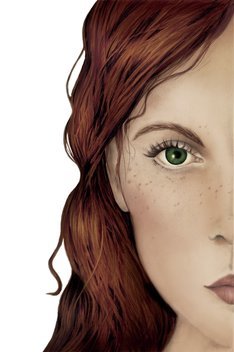
Ella Kepler was created in Astronomy class, hence the space reference here and throughout Whitewashed. Her name was stolen from my favorite childhood book, Ella Enchanted. (Let's not talk about the movie. No really, don't bring it up. I will get depressed.)
The name "Ella" was a filler at first, because I had no idea what else to call her. The last name came from the fact that, when I started writing, we were discussing Kepler's laws of planetary motion. Which I still don't really understand, but I think Kepler is a cool name. As the story progressed, the name Ella started to fit her character, and I realized that she was officially Ella Jane Kepler.
During my first draft, Ella was essentially me planted into a book. She reacted to everything the way I would; she had all the same interests as me; she spoke exactly the way I did. She was the athletic and braver version of me. And then people told me they hated Ella's character, which made me feel super awkward. I like to think that the two of us progressed together. As she became less obnoxious, so did I. I hope.
Apparently, making the protagonist a carbon copy of yourself happens with a lot with newbie writers, whether intentionally or unintentionally. I didn't think it was a problem until my sister said (in reference to something brave Ella does): "That seemed really out of character for Ella, since I keep picturing her as you and I can't imagine you doing that."
Oh dear.
I started to put disclaimers above the book before I let people read it. "Ella is NOT me, so please do not compare her actions to things that I would/wouldn't do, since that will deter you from appreciating her for the unique character that she is." Then I realized that I shouldn't have to put disclaimers, because it should be obvious in my writing that Ella isn't me. So I reevaluated her some more, and then she became an entirely different human being. Less like me, more like her. And then some people started to actually like her. Again, super awkward.
I didn't know she had reddish hair until I saw a photo of a random girl, and then BOOM. I knew that's what Ella looked like, even though at the time Ella's hair was brown and she had no freckles. But suddenly, she did. And somehow, the changing of Ella's appearance made her into a different character. Odd how that can happen, isn't it?
The most challenging thing about writing Ella is when she does things that I don't like, and then I want to shout, "Stop being so stupid!" But then I remember that she can't be smart unless she was at one point stupid, and it sort of makes me feel better. Another difficult thing is that Ella's character in The Trace differs from Ella's character in The Integer . I finally got her character down in The Trace , and then basically had to retrograde in order to write The Integer . Which means Ella does a lot more frustrating and angsty things that make me sigh and want to tell her, in my calm, wise voice, that everything will make sense in due time.
Anyway, there are a few paragraphs about Ella. You might not like her. And that's okay. I don't like everyone I meet, either.

Published on May 29, 2017 21:00
May 21, 2017
PRE-LAUNCH RAMBLE
So, tomorrow The Trace will officially release. Books won't plop on doorsteps at 12:01 a.m., but eBooks will unlock, and, later this week, paperback "Hey-these-are-real!" books will start arriving. Which leaves me over here a bit like this:  That's right. Sure, I've got a little bit of this,
That's right. Sure, I've got a little bit of this,  but I'm mainly a puddle of self-doubt and terror. Why am I like this? Well, because I'm a human being, not a bastion of assurance and repose.
but I'm mainly a puddle of self-doubt and terror. Why am I like this? Well, because I'm a human being, not a bastion of assurance and repose.
It's a dangerous business, going out your front—wait, what am I doing? What I meant was: it's a scary concept to me, this idea of faceless readers thumbing through my book, dog-earring the pages (don't you dare), tossing it aside as they dig through their bags, absorbing my sentences into their brain. How does one emotionally prepare for such a thing? Not that I want to complain, because, again, I'm excited! See giddy Frodo above? That's me! That is, until I remember that not every reader will regard my book with the same affection as me.
I've had months to prepare for this, but I'm still quaky. It's humbling for me to admit that I'm not a cool cucumber at the moment, especially because everyone keeps asking me how I feel, and I keep putting up the "I'm all eagerness and no terror!" facade. The truth is that I am quite afraid. This is a leap for me, a plunge into the utter unknown, because I cannot predict how hundreds of individual brains will react to The Trace. Love it? Hate it? Feel indifferent?
Here's where I start telling myself this, in very bold and giant letters: STOP WORRYING SO MUCH.
There. I feel relieved. People may love it, people may hate it—but, in the end, my brain was overrun with a story, and now that story is out. I've done it. And that's something to celebrate.
Wanna celebrate with me? Shoot me a message, a comment, whatever you like! Tell me about a time you were nervous to share your work but did it anyway. I'll pat you on the back and ask you how you did it. Then we'll watch LotR together.
 That's right. Sure, I've got a little bit of this,
That's right. Sure, I've got a little bit of this,  but I'm mainly a puddle of self-doubt and terror. Why am I like this? Well, because I'm a human being, not a bastion of assurance and repose.
but I'm mainly a puddle of self-doubt and terror. Why am I like this? Well, because I'm a human being, not a bastion of assurance and repose.It's a dangerous business, going out your front—wait, what am I doing? What I meant was: it's a scary concept to me, this idea of faceless readers thumbing through my book, dog-earring the pages (don't you dare), tossing it aside as they dig through their bags, absorbing my sentences into their brain. How does one emotionally prepare for such a thing? Not that I want to complain, because, again, I'm excited! See giddy Frodo above? That's me! That is, until I remember that not every reader will regard my book with the same affection as me.
I've had months to prepare for this, but I'm still quaky. It's humbling for me to admit that I'm not a cool cucumber at the moment, especially because everyone keeps asking me how I feel, and I keep putting up the "I'm all eagerness and no terror!" facade. The truth is that I am quite afraid. This is a leap for me, a plunge into the utter unknown, because I cannot predict how hundreds of individual brains will react to The Trace. Love it? Hate it? Feel indifferent?
Here's where I start telling myself this, in very bold and giant letters: STOP WORRYING SO MUCH.
There. I feel relieved. People may love it, people may hate it—but, in the end, my brain was overrun with a story, and now that story is out. I've done it. And that's something to celebrate.
Wanna celebrate with me? Shoot me a message, a comment, whatever you like! Tell me about a time you were nervous to share your work but did it anyway. I'll pat you on the back and ask you how you did it. Then we'll watch LotR together.
Published on May 21, 2017 12:30
April 5, 2017
Le Book Cover
Once upon a time,
I had an idea for The Trace's book cover
. I penned a letter to [Facebook messaged] a girl I used to play with when I was a wee youngster, someone who grew into a very talented artist. (I'm talking about her, not me.) I asked her, "Hey, can you draw half of a normal face and half of a creepy, zombie-like monstrosity? K thanks." Years later, I met another talented artist via an interview for an article. I kept her on my talented friends back burner and eventually approached her with a request: Can you take this sketch and turn it into a book cover? K thanks.
This is the result. This cover exceeds all my expectations. And trust me, they were pretty high. The odd thing is, I didn't technically decide what Ella looks like. My two artists did. That thrills me, especially because my brain is no good with visual effects, so I honestly found it hard to picture Ella as anything other than a blob with hair. I gave the sketch artist some photos to model after and let her use her own imagination. When the graphic artist added the coloring, I gave her my preferences, but ultimately she created the perfect hair, skin, and eye colors. Ella herself became a collaborative effort between three people. And now I finally know what Ella looks like! My readers can, too. If you want to picture Ella while reading, just jump to the front cover. Or come up with your own image. I won't be offended. My good friend who's read the book a few times is still convinced Ella has brown hair. She's half right, at least.
This cover exceeds all my expectations. And trust me, they were pretty high. The odd thing is, I didn't technically decide what Ella looks like. My two artists did. That thrills me, especially because my brain is no good with visual effects, so I honestly found it hard to picture Ella as anything other than a blob with hair. I gave the sketch artist some photos to model after and let her use her own imagination. When the graphic artist added the coloring, I gave her my preferences, but ultimately she created the perfect hair, skin, and eye colors. Ella herself became a collaborative effort between three people. And now I finally know what Ella looks like! My readers can, too. If you want to picture Ella while reading, just jump to the front cover. Or come up with your own image. I won't be offended. My good friend who's read the book a few times is still convinced Ella has brown hair. She's half right, at least.
The back cover is also beautiful, but that's not quite finished yet. I'm excited to reveal it to you when it's done! What do you think will be on it?
This is the result.
 This cover exceeds all my expectations. And trust me, they were pretty high. The odd thing is, I didn't technically decide what Ella looks like. My two artists did. That thrills me, especially because my brain is no good with visual effects, so I honestly found it hard to picture Ella as anything other than a blob with hair. I gave the sketch artist some photos to model after and let her use her own imagination. When the graphic artist added the coloring, I gave her my preferences, but ultimately she created the perfect hair, skin, and eye colors. Ella herself became a collaborative effort between three people. And now I finally know what Ella looks like! My readers can, too. If you want to picture Ella while reading, just jump to the front cover. Or come up with your own image. I won't be offended. My good friend who's read the book a few times is still convinced Ella has brown hair. She's half right, at least.
This cover exceeds all my expectations. And trust me, they were pretty high. The odd thing is, I didn't technically decide what Ella looks like. My two artists did. That thrills me, especially because my brain is no good with visual effects, so I honestly found it hard to picture Ella as anything other than a blob with hair. I gave the sketch artist some photos to model after and let her use her own imagination. When the graphic artist added the coloring, I gave her my preferences, but ultimately she created the perfect hair, skin, and eye colors. Ella herself became a collaborative effort between three people. And now I finally know what Ella looks like! My readers can, too. If you want to picture Ella while reading, just jump to the front cover. Or come up with your own image. I won't be offended. My good friend who's read the book a few times is still convinced Ella has brown hair. She's half right, at least.The back cover is also beautiful, but that's not quite finished yet. I'm excited to reveal it to you when it's done! What do you think will be on it?
Published on April 05, 2017 07:23
December 7, 2016
The day that came
I have exciting news for you. The post I've dreamed about writing is finally being written, right now, by me. The purpose of this post is to share those four magical words:
I found a publisher.
Yes, you read correctly. My book is being published. Not just The Trace, but the series. Whitewashed is going to enter the real world. And you're going to ride along with me.
For those following my blog (I know you exist), you'll have seen my woes over query letters, literary agents, publishing houses, etc. You'll have seen my gradual lean toward the autonomy and freedom that self-publishing provides. Well, take traditional publishing and self-publishing, add them together, and you'll wind up with Evolved Publishing.
So, what happens now? Well, it's all a bit new and uncertain, so I can't give you every detail. But I can say this: it's going to be an adventure, and if you stick around, we'll unravel it together. The Trace is getting published. Ella Kepler will enter the real world. And you, dear reader, will finally get the story I've been wanting to give you.
I found a publisher.
Yes, you read correctly. My book is being published. Not just The Trace, but the series. Whitewashed is going to enter the real world. And you're going to ride along with me.
For those following my blog (I know you exist), you'll have seen my woes over query letters, literary agents, publishing houses, etc. You'll have seen my gradual lean toward the autonomy and freedom that self-publishing provides. Well, take traditional publishing and self-publishing, add them together, and you'll wind up with Evolved Publishing.
So, what happens now? Well, it's all a bit new and uncertain, so I can't give you every detail. But I can say this: it's going to be an adventure, and if you stick around, we'll unravel it together. The Trace is getting published. Ella Kepler will enter the real world. And you, dear reader, will finally get the story I've been wanting to give you.
Published on December 07, 2016 10:50
December 1, 2016
So...What's your book about?
You have no idea how stressful this question is. It's a common question, obviously.
"What do you do?"
"Oh, I'm a writer."
"Oh, cool! Have you written a book?"
"Yeah, I have!"
"Awesome! What's it about?"
".........Uh, a girl...yeah, a girl. She, uh...yeah."
You'd think I'd know how to answer this question. I've had five years of practice. Besides, I wrote the dang book! I can quote passages verbatim. But I couldn't tell ya what it's about.
Initially when people asked what my book was about, I'd compare it to Hunger Games, X-Men, and the Percy Jackson books. HG for the female-heroine-must-fight-for-justice theme; X-Men for the whole academy of superhumans plot; and I honestly have no recollection for why I used Percy Jackson. But there you have it. If you like all of those stories, you might like mine.
The first confusion is the genre confusion. The Trace fits trickily into a couple genres. I can tell you that it's YA, but once I say "sci-fi," people think aliens and space battles. If I say "light sci-fi," people think it's quasi-scientific. "Urban sci-fi" evokes lightsaber street-fighting; "fantasy" evokes dragons; "fiction" is too vague. So I skip the genre question when people ask me and go straight to the synopsis.
I've had to write synopses for query letters, my website, and my book cover. Each time, I start fresh and try a new approach, and it always sounds like either the most boring or most epic book of all time.
"Ella Kepler had weird things happen to her. Then she realized she was special and she did stuff."
Or:
"The world isn't as it seems, and Ella Kepler is about to have the truth thrust upon her, a truth that will define her as she's never been before."
I don't even know what either of those two hooks are saying. And I wrote them.
Writing a synopsis is harder than writing a book. True story. Thankfully, I have an editor who has worked his magic. We've come up with a first-person synopsis that I'm much more comfortable with. This is from Ella's POV, instead of from this omniscient narrator who sounds detached. Omniscient narrator doesn't know how to tell Ella's story – only she does.
So, here is what my book is about. I'm letting you read it with no pressure, no expectations, and without me awkwardly fumbling for an explanation. Henceforth, when people ask what my book is about, I'm just gonna say, "Go to AdelaideThorne.com" and walk away.
('Cause that's not awkward at all.)
For centuries, a covert organization of metahumans called the Academy has protected unaware civilians from the Grifters—creatures whose humanity is as deformed as their craggy faces. I spent eighteen years ignorant of either group and their endless war. Then, the Grifters found me.
The Academy whisked me away to safety while the danger passed. Only it didn’t. The Grifters, too stupid to know or too cruel to care that I’d left, kidnapped my best friend instead. It won’t take them long to figure out their mistake, but I’m not going to give them the opportunity.
Finding Kara means grueling training at the Academy—a sequestered hub of classified operations, physic powers, and fighting creatures that should only exist in nightmares. The Academists know they’re strong. Grifters are stronger. But we’ve got the weapons, the technology, the brains. Who cares if the Grifters can’t feel pain? We can, and Grifters are the perfect outlet.
The Trace is the first book in a young-adult trilogy following Ella Kepler, a nascent metahuman whose strength and speed is matched only by the enemies set against her.
"What do you do?"
"Oh, I'm a writer."
"Oh, cool! Have you written a book?"
"Yeah, I have!"
"Awesome! What's it about?"
".........Uh, a girl...yeah, a girl. She, uh...yeah."
You'd think I'd know how to answer this question. I've had five years of practice. Besides, I wrote the dang book! I can quote passages verbatim. But I couldn't tell ya what it's about.
Initially when people asked what my book was about, I'd compare it to Hunger Games, X-Men, and the Percy Jackson books. HG for the female-heroine-must-fight-for-justice theme; X-Men for the whole academy of superhumans plot; and I honestly have no recollection for why I used Percy Jackson. But there you have it. If you like all of those stories, you might like mine.
The first confusion is the genre confusion. The Trace fits trickily into a couple genres. I can tell you that it's YA, but once I say "sci-fi," people think aliens and space battles. If I say "light sci-fi," people think it's quasi-scientific. "Urban sci-fi" evokes lightsaber street-fighting; "fantasy" evokes dragons; "fiction" is too vague. So I skip the genre question when people ask me and go straight to the synopsis.
I've had to write synopses for query letters, my website, and my book cover. Each time, I start fresh and try a new approach, and it always sounds like either the most boring or most epic book of all time.
"Ella Kepler had weird things happen to her. Then she realized she was special and she did stuff."
Or:
"The world isn't as it seems, and Ella Kepler is about to have the truth thrust upon her, a truth that will define her as she's never been before."
I don't even know what either of those two hooks are saying. And I wrote them.
Writing a synopsis is harder than writing a book. True story. Thankfully, I have an editor who has worked his magic. We've come up with a first-person synopsis that I'm much more comfortable with. This is from Ella's POV, instead of from this omniscient narrator who sounds detached. Omniscient narrator doesn't know how to tell Ella's story – only she does.
So, here is what my book is about. I'm letting you read it with no pressure, no expectations, and without me awkwardly fumbling for an explanation. Henceforth, when people ask what my book is about, I'm just gonna say, "Go to AdelaideThorne.com" and walk away.
('Cause that's not awkward at all.)
For centuries, a covert organization of metahumans called the Academy has protected unaware civilians from the Grifters—creatures whose humanity is as deformed as their craggy faces. I spent eighteen years ignorant of either group and their endless war. Then, the Grifters found me.
The Academy whisked me away to safety while the danger passed. Only it didn’t. The Grifters, too stupid to know or too cruel to care that I’d left, kidnapped my best friend instead. It won’t take them long to figure out their mistake, but I’m not going to give them the opportunity.
Finding Kara means grueling training at the Academy—a sequestered hub of classified operations, physic powers, and fighting creatures that should only exist in nightmares. The Academists know they’re strong. Grifters are stronger. But we’ve got the weapons, the technology, the brains. Who cares if the Grifters can’t feel pain? We can, and Grifters are the perfect outlet.
The Trace is the first book in a young-adult trilogy following Ella Kepler, a nascent metahuman whose strength and speed is matched only by the enemies set against her.
Published on December 01, 2016 06:19
June 6, 2016
The Integer
Book 2 had a title, and then it didn't. It had a title that I thought was pretty cool, but the more I researched the word, the more I realized that anamnesis is something far too deep and complex to be attributed to a single book. Anamnesis is a more encompassing word that, in my mind, is the crux of the whole trilogy. So Book 2 became title-less again.
I remember how long it took me to come up with a name for The Trace. I tried variations of different things for weeks until I finally settled on a title that I thought worked. The Integer came from a two-minute search. When I read the full definition, it clicked.
To explain why I chose The Integer, I probably need to explain why I chose The Trace. Essentially, The Trace is about Ella searching through remnants to a conclusion that is expounded upon in The Integer. There are left behind traces that she is tracing back to their origin. That's a pretty vague explanation, but I don't want to give too much away. An integer is a whole number; and, more importantly, a complete entity. In the first book, Ella traces evidence to discover the whole picture - a complete entity - that is detailed in The Integer. So, a trace leads to an integer. Get it?
What is the state of The Integer now, you might ask? Let me tell you, dear reader. Book 2 is in the content-rewrite phase. This means my editor has given me his critiques, and now I'm reevaluating The Integer's execution. Once we're satisfied with that, so begins the line editing. It is a lot more almost done than I mentioned in my previous post, so I can fairly say that "almost" might mean "almost" now. Editing season is almost done, and I'm happy.
I love editing. I've talked about it before; I'll talk about it again. Editing is fun because the spilling process is over, and now I have the almost whole picture that I get to fix. I like fixing. And I definitely like whole pictures (like integers. Get it again?).
My personal writing/editing process goes as follows:Spill words in Microsoft WordPrint out giant document at StaplesScribble and scratch out all over the 300+ pagesFix up Word document a few more times until I get to the stage where I think the story is coming to a finishing closeTake a break from writingRead the document on my Kindle, which helps me find grammar mistakes/typosFix all those on WordGive the book to someone to readAssess their edits/suggestionsDo any Word changes that need to be doneKindle it up until I'm satisfiedRun to my editor and say, "K, here you go."
It might be a weird process, but it works for me. Taking a break and changing the medium in which I read the book are the two most important steps. A break gets me out of the tunnel vision that developed while writing, and reading on something other than a computer gives my eyes a break and helps me view the book as more of a book and less of a bunch of words put together. On a Kindle, my book seems real and legit. I get a little giddy. Then I go through the "cringing" phase where I regret ever writing. It's a process, folks.
During this content-edit stage, I must take my brain out of Book 3. Not that I haven't, erm, already started rewriting it. Not that I haven't, erm, already started a novella that will take place after Book 3.
Anyway. Now let's chat about the cover. Say goodbye to your favorite freckled gal, because The Integer will feature someone much less normal. I'm not talking about a Grifter here - just your average, hyper-thorough teenage guy who makes Ella (and me) want to pull her hair out because he's so flipping systematic and particular and stubborn.
Ethan Sheedy, welcome to the book cover.
Annelise worked her magic on this guy, who has just the "My life is too serious for you to understand" expression that he needed. He's even got that freckle by his eye, as described in Le Trace! Don't worry; his black-and-white state is only temporary. He's in the hands of Marianne , who loves putting up with my "Actually, make his eyes this color" and "What if you invert him?" and "I've decided I want Ella's face again; can you manipulate Ethan until he resembles Ella?" (Just kidding. Marianne would kill me. And say, "Uh, no" because she's a sensible human being.)
I'll keep you posted on the simultaneous progression of Ethan and The Integer. Stay tuned for the book synopsis and the reveal for the BACK cover! Any ideas?

I remember how long it took me to come up with a name for The Trace. I tried variations of different things for weeks until I finally settled on a title that I thought worked. The Integer came from a two-minute search. When I read the full definition, it clicked.
To explain why I chose The Integer, I probably need to explain why I chose The Trace. Essentially, The Trace is about Ella searching through remnants to a conclusion that is expounded upon in The Integer. There are left behind traces that she is tracing back to their origin. That's a pretty vague explanation, but I don't want to give too much away. An integer is a whole number; and, more importantly, a complete entity. In the first book, Ella traces evidence to discover the whole picture - a complete entity - that is detailed in The Integer. So, a trace leads to an integer. Get it?
What is the state of The Integer now, you might ask? Let me tell you, dear reader. Book 2 is in the content-rewrite phase. This means my editor has given me his critiques, and now I'm reevaluating The Integer's execution. Once we're satisfied with that, so begins the line editing. It is a lot more almost done than I mentioned in my previous post, so I can fairly say that "almost" might mean "almost" now. Editing season is almost done, and I'm happy.
I love editing. I've talked about it before; I'll talk about it again. Editing is fun because the spilling process is over, and now I have the almost whole picture that I get to fix. I like fixing. And I definitely like whole pictures (like integers. Get it again?).
My personal writing/editing process goes as follows:Spill words in Microsoft WordPrint out giant document at StaplesScribble and scratch out all over the 300+ pagesFix up Word document a few more times until I get to the stage where I think the story is coming to a finishing closeTake a break from writingRead the document on my Kindle, which helps me find grammar mistakes/typosFix all those on WordGive the book to someone to readAssess their edits/suggestionsDo any Word changes that need to be doneKindle it up until I'm satisfiedRun to my editor and say, "K, here you go."
It might be a weird process, but it works for me. Taking a break and changing the medium in which I read the book are the two most important steps. A break gets me out of the tunnel vision that developed while writing, and reading on something other than a computer gives my eyes a break and helps me view the book as more of a book and less of a bunch of words put together. On a Kindle, my book seems real and legit. I get a little giddy. Then I go through the "cringing" phase where I regret ever writing. It's a process, folks.
During this content-edit stage, I must take my brain out of Book 3. Not that I haven't, erm, already started rewriting it. Not that I haven't, erm, already started a novella that will take place after Book 3.
Anyway. Now let's chat about the cover. Say goodbye to your favorite freckled gal, because The Integer will feature someone much less normal. I'm not talking about a Grifter here - just your average, hyper-thorough teenage guy who makes Ella (and me) want to pull her hair out because he's so flipping systematic and particular and stubborn.
Ethan Sheedy, welcome to the book cover.
Annelise worked her magic on this guy, who has just the "My life is too serious for you to understand" expression that he needed. He's even got that freckle by his eye, as described in Le Trace! Don't worry; his black-and-white state is only temporary. He's in the hands of Marianne , who loves putting up with my "Actually, make his eyes this color" and "What if you invert him?" and "I've decided I want Ella's face again; can you manipulate Ethan until he resembles Ella?" (Just kidding. Marianne would kill me. And say, "Uh, no" because she's a sensible human being.)
I'll keep you posted on the simultaneous progression of Ethan and The Integer. Stay tuned for the book synopsis and the reveal for the BACK cover! Any ideas?

Published on June 06, 2016 21:00
May 25, 2016
The Protag Problem
Lurking behind (in front of, more accurately) every great story is the problem of the pesky protagonist. It's an unavoidable conundrum, like 5:00 traffic and colds and popsicles that drip all over the side of your hand. Writers are given the impossible task of creating a protagonist who is well-liked (or, dare I say it, well-loved) by all readers. I say impossible, because it's literally IMPOSSIBLE. I have been struggling with this problem ever since I started writing Whitewashed. “Will readers like Ella? Will they think she's annoying? Whiny? Weak? Stupid? Useless? Boring?” and pretty much every other antonym to character virtue. I remember when I first read Order of the Phoenix way back when. If you've read this, you'll recall that Harry is the most obnoxious brat for the first half of the book. “Why won't anyone tell me anythiiiiing? Why can't I be Prefect? Ron, I'm better than you. I'm the Chosen One! Why don't I know what's going on??!!@#%!1” until you're like HARRY SHUT UP YOU ARE SO ANNOYING. I always thought Harry was the least interesting, most frustrating, of the characters. Later in life, I reread the books, after having written books 1 and 2 of Whitewashed. I was anticipating my hatred of Harry come book 5. Then, something strange happened. I got to OotP, and I was like, I get you, Harry. I got him. Harry's life sucks. Horrible things happen to him on a yearly basis. He's one of the most important figures in the entire wizarding world. So, come 15 years old, Harry's developed a complex. He's the Harry Potter, the one who conquered Voldy as a baby, and who just saw him come back to life after watching a friend die. Harry just wants to know what's going on, for Pete's sake, but Dumbledore seems to think he can't handle the facts. So Harry gets frustrated, because, above all, Harry is a human. He's a teenage guy who has flaws. And that's annoying to readers, like me, who are thinking, “Oh, come on, Harry. Get over yourself.”
Fact: Harry is now my favorite character of the series. He might not be the smartest, funniest, or most interesting, but he's real, and his simplicity helps me relate to him.
Where am I going with this? For most series, the protagonist is not the reader's favorite character. Harry isn't, Katniss isn't, Ender isn't, Tris isn't, Cassie isn't, Bella isn't, Tally isn't, Nancy isn't, Percy isn't.
Why? Because it's easier to see the flaws of the character who conducts the entire story.
Why? Because we're dragged through a story with this character's perspective, and sometimes that character has to be less than 3-dimensional so that readers can slip into their shoes and pretend that said protagonist is them.
Why? Because protagonists are often heroes, and heroes can't become heroes until they're horrible and obnoxious enough to realize they need to change.
Why? Because we're forced to proceed through a story under the leadership of someone who might do all the things that we would never do.
Why? Because the protagonist isn't us.
We know our strengths and weaknesses. We know how we would get things done. When the protagonist doesn't get things done the way we would, it's annoying. Like, super annoying. You idiot, just trust Dumbledore. Just make a decision: Peeta or Gale. Just flipping throw the ring into the flipping lava.
It's more than that, though, something I only realized after having written a trilogy. Yes, protagonists do stupid things that we could do better. Beyond that, however, is the truth that protagonists must have some level of blandness to them in order for the reader to sink inside the story. I'm sure many would disagree with me, but I think that an overly complex protagonist might suffocate the story, drowning it out so that the plot can't move. (Note: This idea of mine is only applicable to a plot-driven story.) Sometimes the secondary characters are the real moving pieces of the story, and the protagonist needs to simmer down so that the others guys can do their thing. Often times, the protagonist is a vehicle that needs to be simple enough for a first-time driver to settle into.
This post is a self-serving one, written in anticipation of all the future Ella-haters. People are going to hate Ella. They'll think she's stupid, bland, useless—and maybe she is. (Wait, I don't think she is!) She'll cause eye-rolling, book-throwing, and even book-hating. At times, I'm intending for her to induce eye-rolling, because I want her to go through some selfish/emo/frustrating stints to show her growth beyond them. Other times, she might just annoy you, because perhaps she does stupid things and there's a certain amount of objectivity in that which can't be ignored. My answer to that is this: I'm sorry if you hate Ella. I tried to make her raw and human, and perhaps I failed miserably. She's not the I-don't-care-what-anyone-thinks, I-get-things-done, tough-as-all-get-out, calm-and-serene sort of character, so if that's what you're searching for in a protagonist, fair warning: You'll hate Ella, and most likely Whitewashed.
Protagonists are hard to create. I'll be honest, I've become a lot more lenient on protagonists since I started writing. I get the struggle, and the frustration that can ensue when readers hate your protagonists. Whenever I read and the protagonist does something annoying, I try to be generous. Hey, nobody's perfect. Nobody is going to do things the way I would. And that's okay. It's not a prerequisite that readers fall in love with your protagonist (though it would definitely keep the book more interesting). And who knows—one day, a few years down the road, a formerly hated protagonist might become suddenly understandable, because readers change. Protagonists do, too. We're all only human, after all.
(Unless your protagonist is non-human, in which case...I'll do another post on that later.)
Fact: Harry is now my favorite character of the series. He might not be the smartest, funniest, or most interesting, but he's real, and his simplicity helps me relate to him.
Where am I going with this? For most series, the protagonist is not the reader's favorite character. Harry isn't, Katniss isn't, Ender isn't, Tris isn't, Cassie isn't, Bella isn't, Tally isn't, Nancy isn't, Percy isn't.
Why? Because it's easier to see the flaws of the character who conducts the entire story.
Why? Because we're dragged through a story with this character's perspective, and sometimes that character has to be less than 3-dimensional so that readers can slip into their shoes and pretend that said protagonist is them.
Why? Because protagonists are often heroes, and heroes can't become heroes until they're horrible and obnoxious enough to realize they need to change.
Why? Because we're forced to proceed through a story under the leadership of someone who might do all the things that we would never do.
Why? Because the protagonist isn't us.
We know our strengths and weaknesses. We know how we would get things done. When the protagonist doesn't get things done the way we would, it's annoying. Like, super annoying. You idiot, just trust Dumbledore. Just make a decision: Peeta or Gale. Just flipping throw the ring into the flipping lava.
It's more than that, though, something I only realized after having written a trilogy. Yes, protagonists do stupid things that we could do better. Beyond that, however, is the truth that protagonists must have some level of blandness to them in order for the reader to sink inside the story. I'm sure many would disagree with me, but I think that an overly complex protagonist might suffocate the story, drowning it out so that the plot can't move. (Note: This idea of mine is only applicable to a plot-driven story.) Sometimes the secondary characters are the real moving pieces of the story, and the protagonist needs to simmer down so that the others guys can do their thing. Often times, the protagonist is a vehicle that needs to be simple enough for a first-time driver to settle into.
This post is a self-serving one, written in anticipation of all the future Ella-haters. People are going to hate Ella. They'll think she's stupid, bland, useless—and maybe she is. (Wait, I don't think she is!) She'll cause eye-rolling, book-throwing, and even book-hating. At times, I'm intending for her to induce eye-rolling, because I want her to go through some selfish/emo/frustrating stints to show her growth beyond them. Other times, she might just annoy you, because perhaps she does stupid things and there's a certain amount of objectivity in that which can't be ignored. My answer to that is this: I'm sorry if you hate Ella. I tried to make her raw and human, and perhaps I failed miserably. She's not the I-don't-care-what-anyone-thinks, I-get-things-done, tough-as-all-get-out, calm-and-serene sort of character, so if that's what you're searching for in a protagonist, fair warning: You'll hate Ella, and most likely Whitewashed.
Protagonists are hard to create. I'll be honest, I've become a lot more lenient on protagonists since I started writing. I get the struggle, and the frustration that can ensue when readers hate your protagonists. Whenever I read and the protagonist does something annoying, I try to be generous. Hey, nobody's perfect. Nobody is going to do things the way I would. And that's okay. It's not a prerequisite that readers fall in love with your protagonist (though it would definitely keep the book more interesting). And who knows—one day, a few years down the road, a formerly hated protagonist might become suddenly understandable, because readers change. Protagonists do, too. We're all only human, after all.
(Unless your protagonist is non-human, in which case...I'll do another post on that later.)
Published on May 25, 2016 14:40
May 6, 2016
The Cost
Published on May 06, 2016 09:42

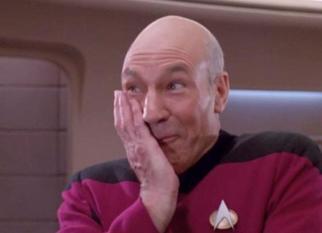
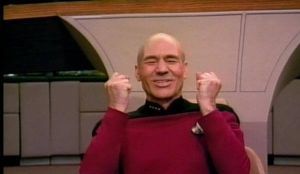 What does this mean? Do you want to know what this means? It means that, since spring of 2011, I have dreamed of this day. I have imagined what I would say when it finally came. IT HAS FINALLY COME.
What does this mean? Do you want to know what this means? It means that, since spring of 2011, I have dreamed of this day. I have imagined what I would say when it finally came. IT HAS FINALLY COME.

